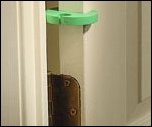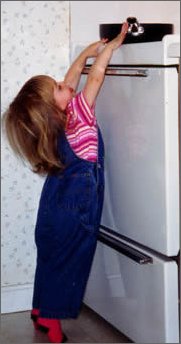The Top 6 Accidents-Waiting-to-Happen in Your Home
by www.SixWise.com
Every year, nearly 20,000 people die and 21 million medical
visits are needed due to home accidents in the United States,
says the U.S. Home Safety Council.
Those most at risk are children and the elderly -- a recent
report from Harvard Medical School found that the chance of
dying from a home accident increases dramatically after the
age of 65. In fact, people over the age of 75 are four times
more likely to die from a home accident than those aged 65
to 74.
Of course, people of all ages can be hurt by an accident
(you've likely got at least one home-accident story of your
own by now). The irony is that most home accidents are the
result of human error and could almost always have been prevented.
1. Cutting yourself with a knife.
We all use knives daily, and it's easy to become careless
with their use. In the UK, for instance, 150 people stab themselves
everyday while trying to open a jar or packaged meal with
a knife. Keeping knives sharpened will make them less likely
to slip (and you'll be less likely to cut yourself while sawing
away at something with a dull knife).
|

Not paying attention while chopping vegetables is an
easy way to cut yourself.
|
2. Slamming fingers in doors/windows.
This can be especially dangerous for kids, whose tiny fingers
could be crushed or even amputated
if they get caught in a door, particularly the hinge side,
or window.
In fact, a study published in the Annals of Emergency Medicine
found that in children aged 4 and younger, three out of four
finger amputations resulted from fingers that were caught,
jammed or crushed in an opening or closing door.
Adults, too, are at risk from carelessly slamming doors and
windows. About 30,000 people in all are rushed to U.S. emergency
rooms each year because they've amputated a finger, and one
of the top two causes is getting fingers slammed in doors.
That's why Sixwise.com highly recommends installing our durable
foam Finger Guards on your doors, particularly on all
doors that children may be opening and closing.
They're simple to install, as they grip to the side or top
of just about any doorframe (we recommend installing them
higher up, out of kids' reach), and they keep doors from slamming.
|
Protect Tiny Fingers With the Finger
Guard 2-Pack

If you ever have children or grandchildren in your
home, protect their fingers from being harmed by a closing
door with these durable foam Finger Guards! It is recommended
to install them on all doors that children may be opening
and closing.
They're simple to install, as they grip to the side
or top of just about any doorframe. Once you want to
shut the door, just pop off the guards.
-
Available in a 2-pack: Install one on each door
that children use in the home
-
Keep doors from slamming and helps prevent painful
and serious finger injuries
-
Are SIMPLE to install and remove
-
Fit most exterior and interior doors
-
Are soft and flexible
-
Made of a sturdy, non-toxic, high-density thermoplastic
-
Are an EXCELLENT VALUE!
Order
the Finger Guard 2-Pack Special Now!
|
3. Falling down the stairs.
Here's a shocking fact: More people
end up in U.S. emergency rooms because of fall-related injuries
than from any other cause.
Falling can occur because a person is rushing, tired, upset,
sick or simply not paying attention, and is a major risk for
the elderly and small children. Open stairways represent a
real hazard because the injuries sustained from falling that
far down can be serious.
To reduce the risk of falling down the stairs, make sure
you have adequate lighting throughout your home, especially
at night, and use a cane or walker if you have trouble walking
or balancing. Another option is to block off stairways, windows
or other dangerous areas using The
Gateway® To Go. It uses a patented, pressure mount
system rated #1 by a leading consumer reporting organization
to keep infants, the elderly or pets safely away from accident-prone
areas.
4. Getting burned while cooking.
Burn injuries leave 60,000 people hospitalized each year
in the United States, and over 5,000 people die from burn-related
injuries.
Cooking is one of the most hazardous activities when it comes
to burns, as a child could reach into a hot oven out of curiosity
or pull down a pot of boiling water from a stovetop. It's
extremely important to always supervise kids in the kitchen,
and be sure to turn pot handles toward the inside of the stove
(even adults can accidentally bump into a protruding pot handle,
causing it to spill.)
Another often overlooked source of home burns is the barbecue
grill. "From grills to barbecue pits, parents need to
make sure their children avoid any area near an open flame,"
said Kim Davies, trauma manager at Children's Medical Center
of Dallas. "This is especially important as you begin
heating up a grill -- it's not hot enough for food, but it's
hot enough to burn."
If you love to grill and have kids at home, the HearthGate™
barbecue and fireplace protection gate is an excellent
solution: It keeps kids away from the grill and out of harm's
way.
|

Always keep pot handles turned in so kids can't pull
them down and get burned.
|
5. Falling out of windows.
According to the Consumer Product Safety Commission, thousands
of young children are killed or injured from falling out of
windows every year. The elderly and pets are also at risk.
Since keeping your windows closed is an unpleasant solution
(especially during the summer months), be sure to always supervise
children, including, and especially, when they have access
to an open window, and consider using a window safeguard like
the Window
Wedge to control the height or width of your window openings.
6. Electrocution.
According to the National Institutes of Health, some 1,000
people die in the United States each year because of electric
shock, and, surprisingly, many occur right in the home. Some
common risks to look out for include extension cords (particularly
old, worn varieties or those that could be picked up by children),
electrical outlets (covering your outlets with the Sliding
Decora Outlet Cover can help keep kids safe), electric
appliances (particularly when they're touched with wet hands)
and pools and hot tubs (from faulty underwater lighting or
old electrical wiring).
Recommended Reading
How
Many Insect Parts and Rodent Hairs are Allowed in Your Food?
More Than You Think
The
Toxic Chemicals Most Linked to Depression
Sources
Health
and Safety Management Consultants
The
Child Accident Prevention Foundation of Australia
Hand
Safety